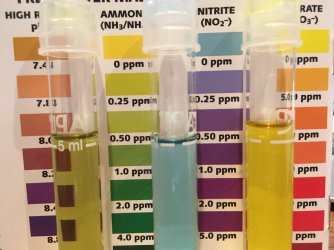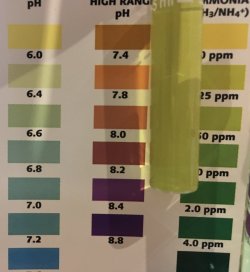As you read from the title, I just tested my tank, and it read .25 - .5 ppm of ammonia, and neither nitrates or nitrites are in it. I'm confused, as my aquarium got cycled for 2 days after I put in concentrated bacteria in it, and it has been sitting for 2 weeks with fish, so even if the original did nothing, there should still be bacteria. However, these tests indicate that something is off. Then again, I didn't test nitrate last night, and I did a water change last night as well, so that might be a contributor.
You are using an out of date browser. It may not display this or other websites correctly.
You should upgrade or use an alternative browser.
You should upgrade or use an alternative browser.
Help! My tank has recorded .25 - .5 ppm of ammonia, and none of the nitrates or nitrites!
- Thread starter Tacocat
- Start date
If I remember correctly, you are doing a fish in cycle. Despite was fish stores claim, bottled bacteria does not cycle a tank instantly.
You need to do a water change, at least half the water. As long as you remember to add water conditioner to remove chlorine or chloramine from the new water, and warm the new water to the same temperature as the tank, this will not harm the fish. The temperature doesn't have to be exact - feel the temperature with your hand and if it feels the same as the tank water, that's good enough.
Test every day for ammonia and nitrite. If either test reads more than zero, do another water change.
There are two possibilities.
The bacteria didn't work and you have ammonia now and you'll get nitrite soon.
Or the bacteria product is working, just not quite enough and you need to grow a few more.
The only way to know which is by daily testing and water changes when the results tell you. It's worth making a note of the test results every day so that you'll know when both have been zero for 7 days - that's when the tank is cycled.
You need to do a water change, at least half the water. As long as you remember to add water conditioner to remove chlorine or chloramine from the new water, and warm the new water to the same temperature as the tank, this will not harm the fish. The temperature doesn't have to be exact - feel the temperature with your hand and if it feels the same as the tank water, that's good enough.
Test every day for ammonia and nitrite. If either test reads more than zero, do another water change.
There are two possibilities.
The bacteria didn't work and you have ammonia now and you'll get nitrite soon.
Or the bacteria product is working, just not quite enough and you need to grow a few more.
The only way to know which is by daily testing and water changes when the results tell you. It's worth making a note of the test results every day so that you'll know when both have been zero for 7 days - that's when the tank is cycled.
I see. Thanks!If I remember correctly, you are doing a fish in cycle. Despite was fish stores claim, bottled bacteria does not cycle a tank instantly.
You need to do a water change, at least half the water. As long as you remember to add water conditioner to remove chlorine or chloramine from the new water, and warm the new water to the same temperature as the tank, this will not harm the fish. The temperature doesn't have to be exact - feel the temperature with your hand and if it feels the same as the tank water, that's good enough.
Test every day for ammonia and nitrite. If either test reads more than zero, do another water change.
There are two possibilities.
The bacteria didn't work and you have ammonia now and you'll get nitrite soon.
Or the bacteria product is working, just not quite enough and you need to grow a few more.
The only way to know which is by daily testing and water changes when the results tell you. It's worth making a note of the test results every day so that you'll know when both have been zero for 7 days - that's when the tank is cycled.
I'm pretty sure It's that there's bacteria but not enough.
ANY time you register ammonia in a tank during a fish-in cycle, a WC is in order, using a good water conditioner, Seachem Prime or API Tap Water Conditioner...change at least 1/2 of the water....then, test again in 24 hours
There is also one more question concerning water changes: Am I supposed to remove the fish when I do it? and should I clean the sponge filter?ANY time you register ammonia in a tank during a fish-in cycle, a WC is in order, using a good water conditioner, Seachem Prime or API Tap Water Conditioner...change at least 1/2 of the water....then, test again in 24 hours
No, and noThere is also one more question concerning water changes: Am I supposed to remove the fish when I do it? and should I clean the sponge filter?
SlapHppy gave you the short answer. Here is the long answer 
It is more stressful for fish to remove them from the tank than to do the water change with them still there. Just keep an eye on where the end of the siphon tube is just in case a particularly nosey fish goes to see what you are doing and gets sucked up.
A filter should not be cleaned for at least 6 weeks so that the newly forming bacteria colonies can settle in properly. The bacteria live in biofilm which is attached to surfaces but until the biofilm is firmly attached to the media it can be dislodged.
It is more stressful for fish to remove them from the tank than to do the water change with them still there. Just keep an eye on where the end of the siphon tube is just in case a particularly nosey fish goes to see what you are doing and gets sucked up.
A filter should not be cleaned for at least 6 weeks so that the newly forming bacteria colonies can settle in properly. The bacteria live in biofilm which is attached to surfaces but until the biofilm is firmly attached to the media it can be dislodged.
My apologies, something came up unexpectedly , and the "short" answer was less than adequate.SlapHppy gave you the short answer. Here is the long answer
It is more stressful for fish to remove them from the tank than to do the water change with them still there. Just keep an eye on where the end of the siphon tube is just in case a particularly nosey fish goes to see what you are doing and gets sucked up.
A filter should not be cleaned for at least 6 weeks so that the newly forming bacteria colonies can settle in properly. The bacteria live in biofilm which is attached to surfaces but until the biofilm is firmly attached to the media it can be dislodged.
To add to the above, DO NO CLEANING in a tank where you are doing a fish-in cycle...just change the water...we do not want to remove any BB (beneficial bacteria) that we are trying so hard to grow...and in a new tank, they grow most/fastest in/on the filter media (a sponge, in this case)...but they are also growing elsewhere in the tank...in the substrate, on deco and plants, etc...
If the sponge gets very dirty, you can rinse it in old tank water, or treated tap water, but NEVER clean your filter media in chlorinated tap water until the tank is mature, at least six months old...even then, I never rinse my media in chlorinated water, I always use old tank water...it takes minimum effort to dump some into a bowl, and let my media sit emerged in it, while I perform a water change
what about the poop that's on the bottom? I've noticed that my fish have a lot of poop, considering I have 3 tetras and 2 guppies(yes I know these guys should be in a bigger tank but rn I can't do anything) and 4 cherry shrimp, and the snail isn't helping. If I cannot mix about the substrate and suck up the ammonia filled poop, what do I do instead?My apologies, something came up unexpectedly , and the "short" answer was less than adequate.
To add to the above, DO NO CLEANING in a tank where you are doing a fish-in cycle...just change the water...we do not want to remove any BB (beneficial bacteria) that we are trying so hard to grow...and in a new tank, they grow most/fastest in/on the filter media (a sponge, in this case)...but they are also growing elsewhere in the tank...in the substrate, on deco and plants, etc...
If the sponge gets very dirty, you can rinse it in old tank water, or treated tap water, but NEVER clean your filter media in chlorinated tap water until the tank is mature, at least six months old...even then, I never rinse my media in chlorinated water, I always use old tank water...it takes minimum effort to dump some into a bowl, and let my media sit emerged in it, while I perform a water change
you can do a light substrate cleaning to suck up the poop. Every day that you see ammonia, you need to do a large water change. And keep an eye on nitirites and nitrates too. Don't clean the filter till your cycle is established. You might want to put in some plants which will also help with cycling.
Thanks for all the replies! I just have one more question then I think I'll do a journal just to keep track of things.
The hell is this supposed to mean? I did a water change 2 days ago, and nitrates haven't gone up, nitrite is the same, and ammonia looks like it went down!
The hell is this supposed to mean? I did a water change 2 days ago, and nitrates haven't gone up, nitrite is the same, and ammonia looks like it went down!
Attachments
3 Ludwigias, a bunch of java moss and a buttload of duckweed would work right?You might want to put in some plants which will also help with cycling.
Last edited:
Avoid duckweed like the plague, it grows uncontrollably, can even clog filters and intakes...consider frogbit, instead3 Ludwigias, a bunch of java moss and a buttload of duckweed would work right?
It should work in a pump tank right? I have a pump that shoots out water at a speed that causes the duckweed to spin around. The grate through which water goes into the pump has only let the smallest inAvoid duckweed like the plague, it grows uncontrollably, can even clog filters and intakes...consider frogbit, instead
Similar threads
- Replies
- 22
- Views
- 967
- Replies
- 13
- Views
- 519



